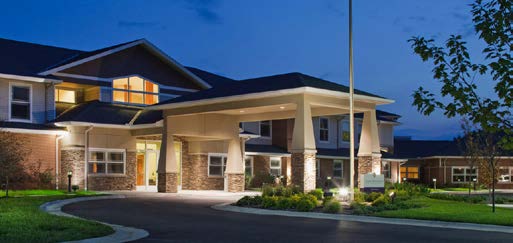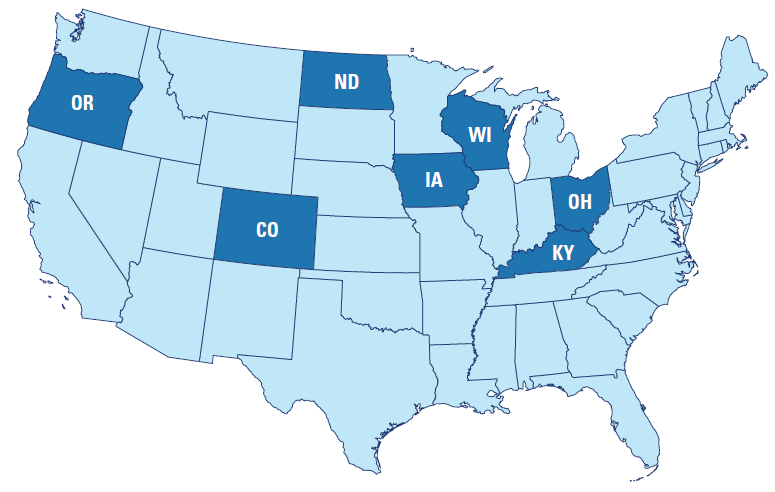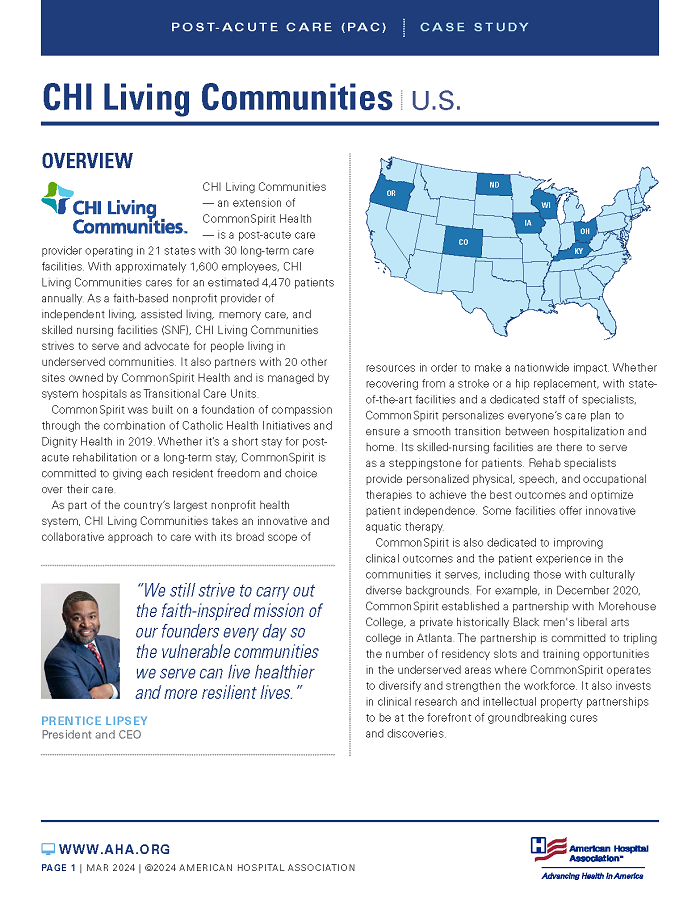

CHI Living Communities | U.S.
Post-Acute Care CARE (PAC) | Case Study
Overview
CHI Living Communities — an extension of CommonSpirit Health — is a post-acute care provider operating in 21 states with 30 long-term care facilities. With approximately 1,600 employees, CHI Living Communities cares for an estimated 4,470 patients annually. As a faith-based nonprofit provider of independent living, assisted living, memory care, and skilled nursing facilities (SNF), CHI Living Communities strives to serve and advocate for people living in underserved communities. It also partners with 20 other sites owned by CommonSpirit Health and is managed by system hospitals as Transitional Care Units.
CommonSpirit was built on a foundation of compassion through the combination of Catholic Health Initiatives and Dignity Health in 2019. Whether it’s a short stay for post-acute rehabilitation or a long-term stay, CommonSpirit is committed to giving each resident freedom and choice over their care.
“We still strive to carry out the faith-inspired mission of our founders every day so the vulnerable communities we serve can live healthier and more resilient lives.”
As part of the country’s largest nonprofit health system, CHI Living Communities takes an innovative and collaborative approach to care with its broad scope of resources in order to make a nationwide impact. Whether recovering from a stroke or a hip replacement, with state-of-the-art facilities and a dedicated staff of specialists, CommonSpirit personalizes everyone’s care plan to ensure a smooth transition between hospitalization and home. Its skilled-nursing facilities are there to serve as a steppingstone for patients. Rehab specialists provide personalized physical, speech, and occupational therapies to achieve the best outcomes and optimize patient independence. Some facilities offer innovative aquatic therapy.

CommonSpirit is also dedicated to improving clinical outcomes and the patient experience in the communities it serves, including those with culturally diverse backgrounds. For example, in December 2020, CommonSpirit established a partnership with Morehouse College, a private historically Black men's liberal arts college in Atlanta. The partnership is committed to tripling the number of residency slots and training opportunities in the underserved areas where CommonSpirit operates to diversify and strengthen the workforce. It also invests in clinical research and intellectual property partnerships to be at the forefront of groundbreaking cures and discoveries.
Patient-Payer Mix

CHI Living Communities has a patient-payer mix that varies widely across its 30 locations, with approximately 60% of its revenue coming from its SNF locations, many of which have Medicaid as their primary payer. As the nation’s leading provider of Medicaid services, CommonSpirit is dedicated to serving communities with limited resources, striving to ensure that all individuals have access to quality care, regardless of their ability to pay.
CHI Living Communities’ SNF locations treat, on average, patients who have higher acuity illnesses and injuries, a trend seen across the post-acute care continuum. Caring for patients with increasingly complex issues only compounds the challenges of providing care amid severe staffing shortages and financial pressures, underscoring the need to preserve and protect public funding for SNFs and other post-acute care options.
Challenges
CHI Living Communities faces many of the challenges wreaking havoc on our nation’s SNFs and senior living settings that have only been exacerbated by the pandemic and recent economic pressures.
1. Staffing
While seeing an increase in demand for its services, CHI Living Communities has simultaneously faced significant workforce challenges. The number of available staff is frequently the determining factor in admitting patients for acute care and transferring them to post-acute care settings. Many members of its workforce have left to join travel agencies, adding to high turnover and forcing CommonSpirit’s SNFs to increase health care staff compensation to unsustainable levels in order to attract new employees.
Additionally, there has been a push to establish higher staffing ratio requirements which would further stress the capacity of all CommonSpirit’s post-acute care living options, especially SNFs.
2. Reimbursement
As one of the nation’s leading providers of Medicaid services, CommonSpirit is experiencing financial stress from the inadequate reimbursement rates from both Medicaid and Medicare, particularly in its post-acute care settings. Any recent rate increases from public payers have failed to keep up with record-high inflation, rising costs, and the level of care provided at CommonSpirit’s SNF locations. This has made it increasingly difficult to operate standalone skilled-nursing facilities and may force CommonSpirit to exit from certain markets.
America’s post-acute care providers – like CHI Living Communities – are struggling to operate under the constraints of Medicaid and Medicare reimbursement and higher operational costs, especially workforce demands. Further, because nursing homes took the brunt of the negative narrative during the COVID-19 pandemic, they are at risk for greater regulatory requirements.
Americans who are aging and living with disabilities will always require access to skilled nursing care – and other post-acute care lines of service. Policymakers should act now to stabilize today’s reimbursement structures to ensure they are balanced with the actual costs of care.



